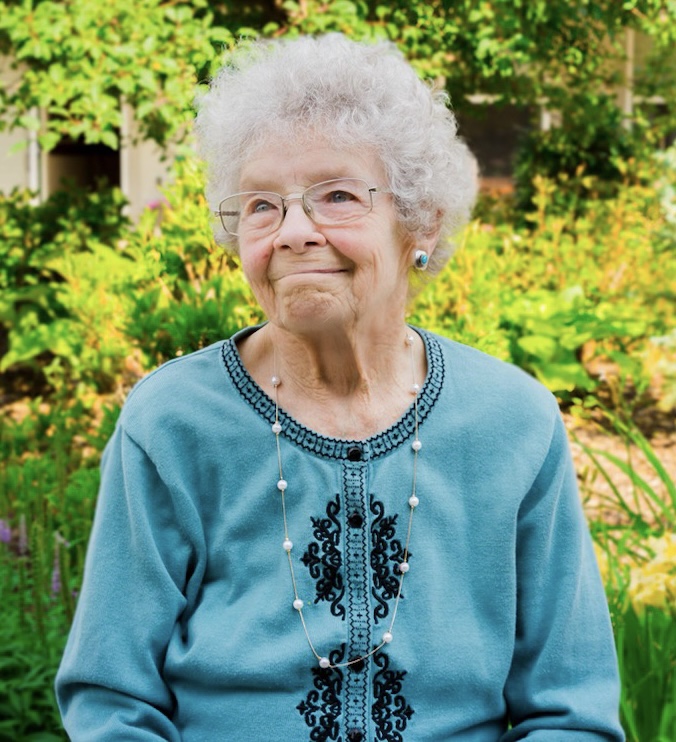My sweet mom passed away on March 18. She had had a marked decline the day before—Saint Patrick’s Day—which, my siblings and I agreed, would have been a perfect day for our Irish Catholic mom to earn her angel wings.

Coincidentally, in January I had been invited to give today’s Easter homily at Spirit of Peace. I understand people hold innumerable philosophical and spiritual beliefs. But in sharing this portion of my homily, my wish is that words of hope, awe, and ultimately, my mother’s gift, touch your heart as they did mine.
After mulling these readings [Acts 10:34a, 37-43; John 20:1-9] and the continuation of John’s Gospel in January, I tucked away the words joy, hope and rebirth. Serendipity intervened weeks later when I discovered a link to a New York Times article in my inbox. The article’s title, “How a Bit of Awe Can Improve Your Health,” and its one-sentence summary, “Experts say wonder is an essential human emotion—and a salve for a turbulent mind,” drew me in.
Imagine the wonder and awe Mary Magdalene experienced when she witnessed the Risen Christ!
UC Berkeley psychologist Dacher Keltner defines awe as “the feeling of being in the presence of something vast that transcends your understanding of the world.” He authored a recent book titled, Awe: The New Science of Everyday Wonder and How It Can Transform Your Life. According to the book blurb, “Keltner shows us how cultivating awe in our everyday life leads us to appreciate what is most humane in our human nature. And during a moment in which our world feels more divided than ever before, and more imperiled by crises of different kinds, we are greatly in need of awe.”
I didn’t realize how great my need for awe was until I presided last month. Plagued by so many disturbing legislative bills and votes that harm students, educators, the LGBTQ+ community, people living in poverty and more, I was overcome by the power of Susan’s Eucharistic Prayer. You witnessed the tremble in my voice as I prayed, “Enable us to become what You long for us to be—people filled with love, awe, grace and compassion,” and “We affirm our unity with people everywhere and express our belief in the dream of God for a time of peace, love, goodness and grace.”
Five days after I proclaimed that prayer, some of my siblings and I had the privilege of gathering with our mom as she prepared to journey home. After nineteen hours, my sister Laurie and I remained. Mom’s ragged breathing quieted, and her mouth moved in a slow, rhythmic cadence. I changed the background music to Calm Celtic Harp and, a minute later, she released a final sigh. Reverent stillness bathed the room as Laurie and I kissed our mom’s cheeks and caressed her rosary-draped hands.
We marvel at first breaths and last, springtime and candlelight, the whisper of leaves rustling in a breeze and a crow’s insistent caw-caw-caw, which reminds my family our Papa is near.
We are awed by fire and water, everyday acts of kindness, morning light and the evening sky when an Eskimo Proverb affirms, “Perhaps they are not stars, but rather openings in heaven where the love of our lost ones pours through and shines down upon us to let us know they are happy.”
Days after my mom passed, I revisited a New York Times opinion piece I’d saved last fall. In an op-ed titled “What My Father’s Death Taught Me About Living,” Lydia Polgreen wrote in part about reconnecting with her estranged father. She said, “The things he failed to provide were nothing compared with what he had given me: the raw materials for a life filled with adventure, connection and meaning. A belief in the fundamental goodness of people across all kinds of difference. A commitment to trying to understand the world and make it understandable to others.”
She continued, “I realize now that the most precious thing my father gave me was an example of how to live a life devoid of cynicism and pessimism. He was a dreamer and an optimist, sometimes to an absurd and even dangerous degree. But a bias toward the vulnerability of hope—that is a true gift.”
My mother gave the same to me.
